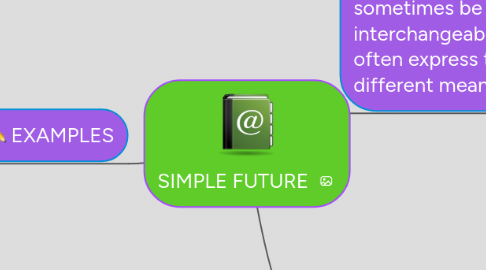
1. EXAMPLES
1.1. I am going to play handball
1.1.1. Negative: I am not going to play handball.
1.1.2. Interrogative: Are you going to play handball?
1.2. He is going to eat pizza
1.2.1. Negative: he is not going to eat pizza
1.2.2. Interrogative: Is he going to eat pizza?
1.3. She is going to spend his vacation in Hawaii
1.3.1. Negative: She is not going to spend his vacation in Hawaii
1.3.2. Interrogative: Is she going to spend his vacation in Hawaii?
2. STRUCTURE
2.1. Be going to
2.1.1. Interrogative: Auxiliar verb (To be)+ subject+ "going to"+ principal verb
2.1.2. Affirmative: Subject+ Auxiliar verb (To be)+ "going to"+ principal verb
2.1.3. Negative: Subject+ Auxiliar verb (To be)+ "not"+"going to"+ principal verb
2.2. Will
2.2.1. Interrogative: "Will"+ Subject+ principal verb
2.2.2. Negative: subject+"will"+"not" or "wont"+ principal verb
2.2.3. Affimartive: Subject+ "will"+ principal verb
3. Simple Future has two different forms in English: "be going to" and "will". Although the two forms can sometimes be used interchangeably, they often express two very different meanings.
3.1. Be going To
3.1.1. We use going to when we have the intention to do something before we speak.
3.1.2. We use it to talk about the future.
3.1.3. The verb be is conjugated
3.2. Will
3.2.1. We use "will" to talk about the future.
3.2.2. to make decisions
3.2.3. To make predictions
3.2.4. To make promises, offers, requests and threats
